









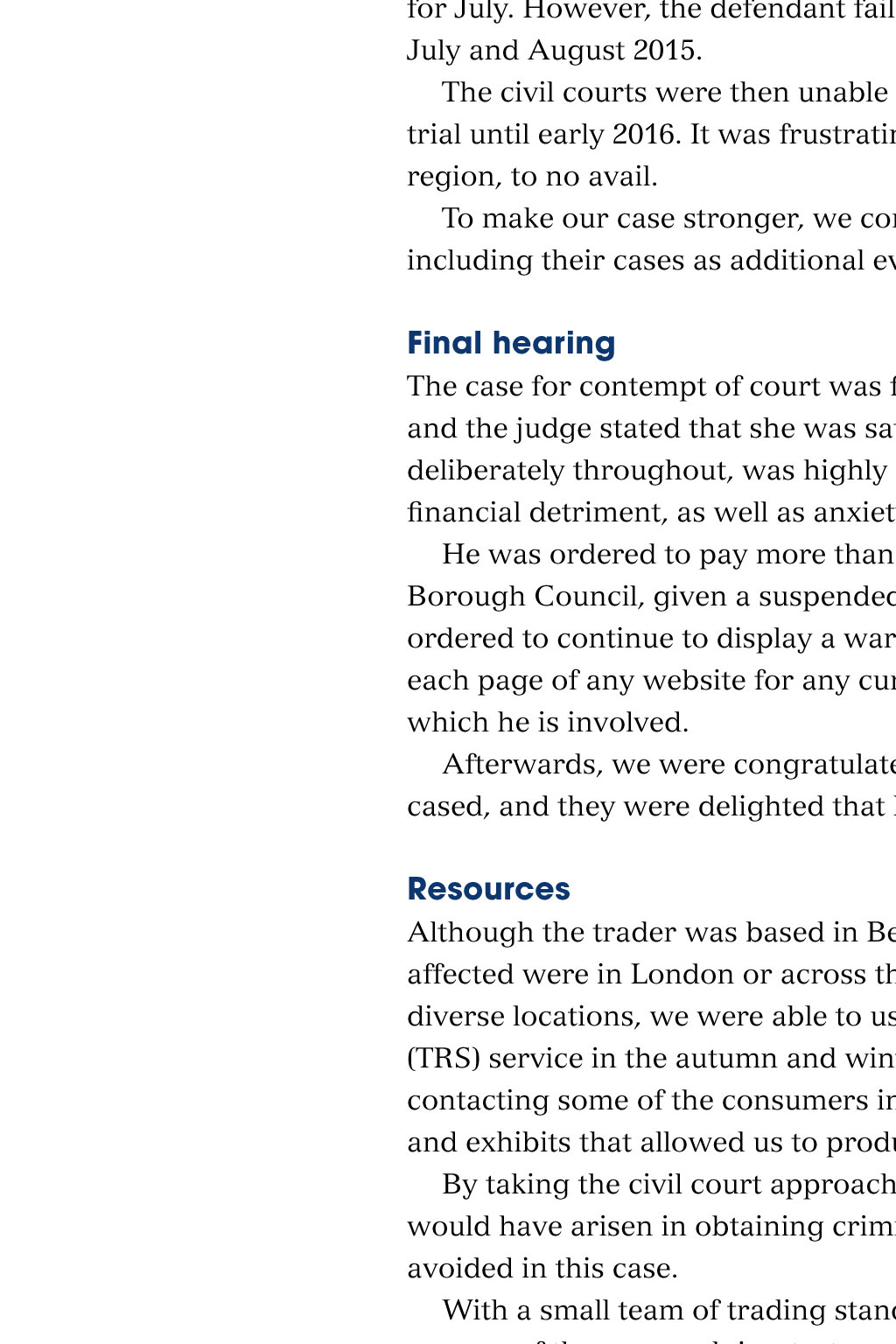
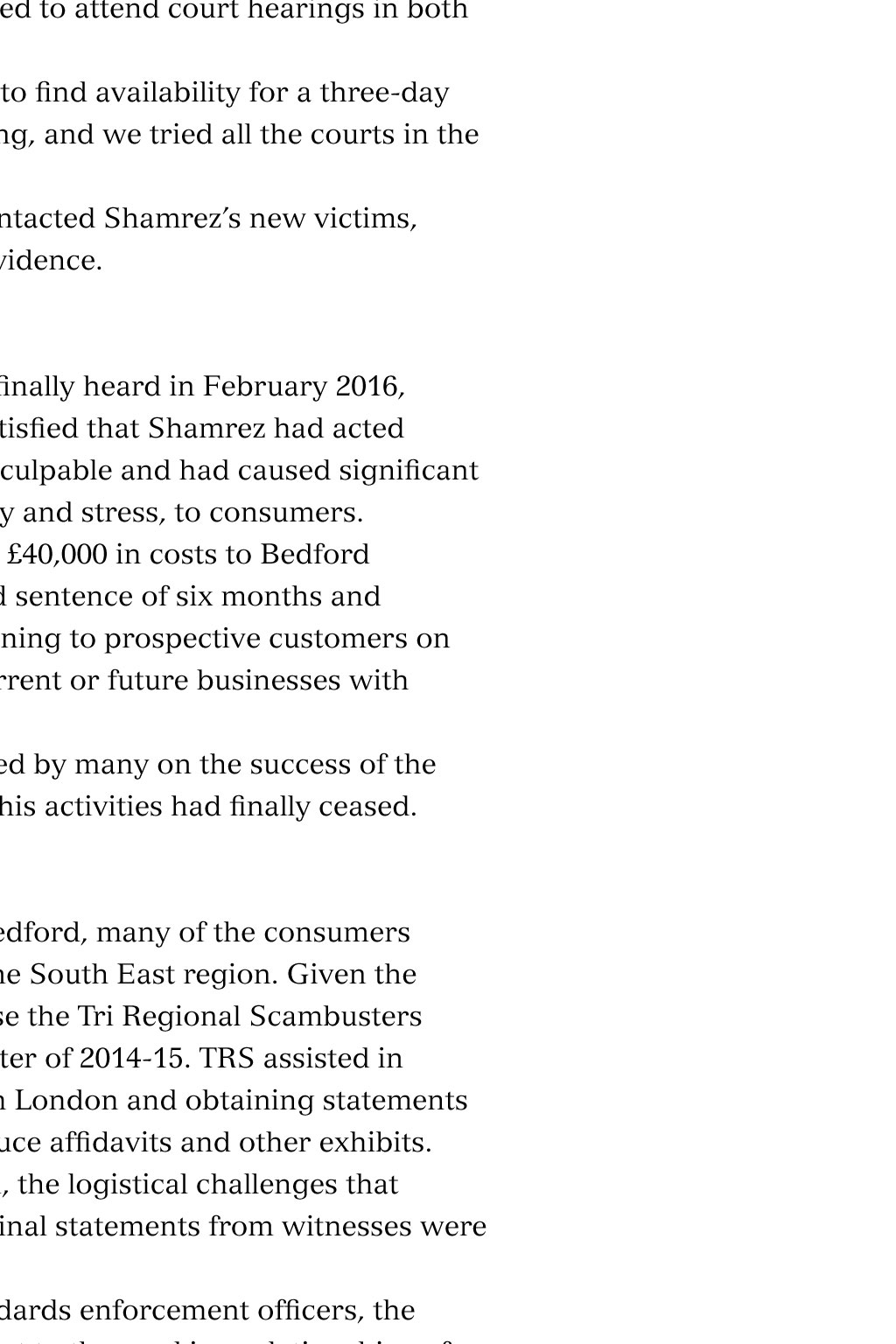
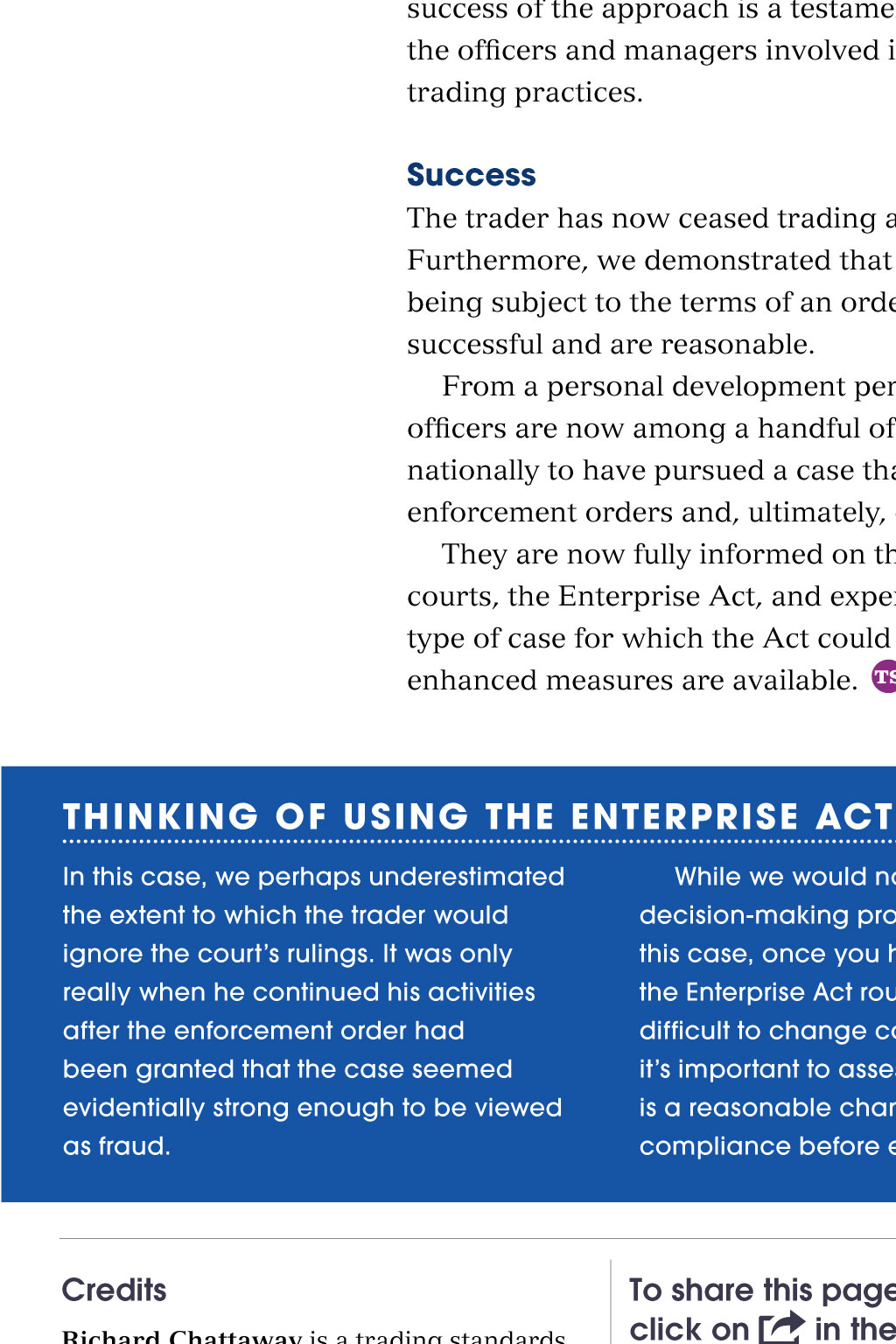
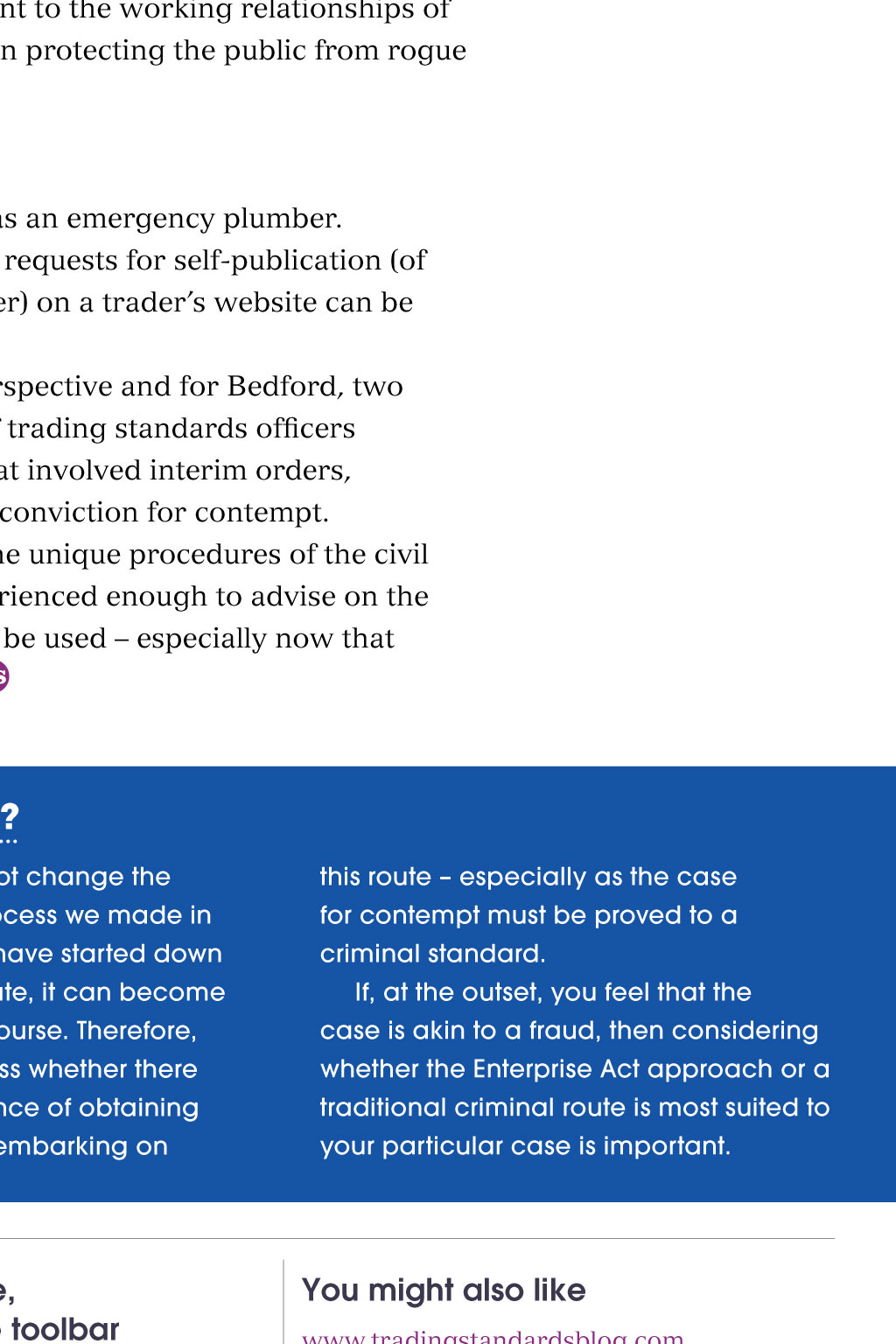
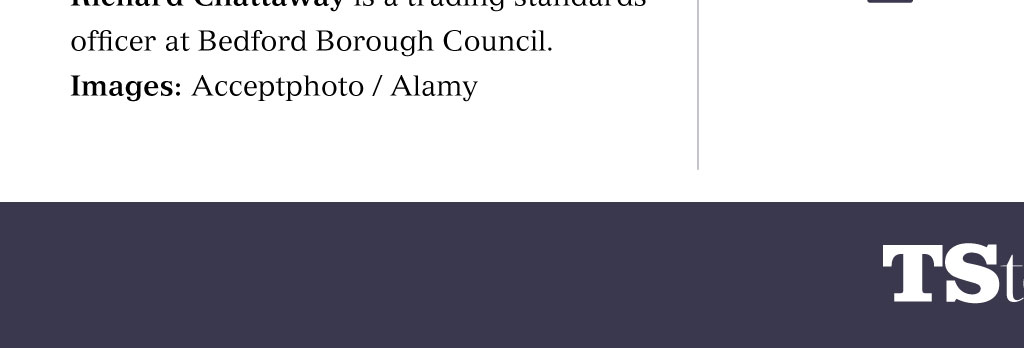


















Enterprise Act 2002: plumbing In this feature l fraud l contempt of court l consumer protection Successful enterprise A rogue emergency plumber was brought down by Bedford Trading Standards through a rare use of the Enterprise Act, and crucially ordered to self-publish his wrongdoing on his own website. Richard Chattaway details the journey I t was late 2011 when Mohammed Shamrez trading as director of Express Plumbing and also known as London Emergency Plumbers first appeared on the BBCs Watchdog programme. Shamrez was exposed for charging extortionate prices for emergency plumbing call-outs, taking payment from consumers without authorisation and overstating the time taken to do a job (see box, The scammer). Around the same time, his practices which occurred largely in theLondon area attracted our attention at Bedford Trading Standards,after officers received numerous referrals from Citizens Advice Consumer Service about the plumber, whose registered office was in Bedford. After some consideration, we decided to go down the civil court route using the Enterprise Act a rare course of action as opposed to prosecuting for fraud in a criminal court, after weighing up the evidence. The Enterprise Act For the purposes of trading standards, the Enterprise Act 2002 is a method of acting against those breaching consumer protection legislation through the civil courts. A key aspect of the approach is the use of an enforcement order, which is essentially a civil injunction ordering an infringing action to cease. As cases are heard in a civil court, a lower standard of proof and the use of hearsay are advantages of the approach. In a case such as this, where there are no fraudulent documents and much of the information is based on what consumers report, this information can be harder to prove, so a large pool of complaints using this approach can work well. In addition, the investigating officer produces the evidence, as opposed to every consumer presenting an individual case useful for when there are geographical challenges, for example, when offending has occurred in different parts of the country. Bedford Trading Standards found that using the Enterprise Act can be an effective route to take, especially in relation to legitimate traders who overstep the line but do not operate in an entirely criminal way. However, if the trader breaches the enforcement order, then the case against him can move to contempt of court proceedings, though these need to be proved to a criminal standard ie beyond reasonable doubt. Making the assessment of whether the civil court approach is best for your case is crucial (see box, Thinking of using the Enterprise Act?). T HE SCAMMER Mohammed Shamrez, director of Express invoice for around 1,000, including VAT, or complainants were unable to Plumbing, which also traded under the although there had been no mention obtain redress. name London Emergency Plumbers, that the initial price excluded VAT. Spending excessive periods of time in customers properties and heavily On the initial call-out, consumers were charged extortionate half-hourly rates, usually between 150 and 185, on top of required to provide card details to secure overcharging for parts while, in many a call-out fee of between 95 and 195. the booking which were then used to cases, leaving the problem unresolved Customers were often not aware that the debit the final amount, often before an were features of Shamrezs approach. cost was per half hour, or assumed the invoice had been received. Recovery of the costs was difficult, and most consumers never recovered Attempts to complain to the problem was simple to fix. Expecting a bill of about 300, customers would then receive an head office Shamrezs home a penny and were left considerably out address received either no response, of pocket. Initial actions In early 2012, we opened consultation with Shamrez, and met him several times to issue extensive written advice and guidance. However, despite our efforts, the complaints persisted and so we obtained signed undertakings about his trading practices in June 2012, in which he agreed to stop his actions. Again, complaints persisted. Sowe started building the case for an enforcement order. A consumer questionnaire was devised as an efficient method to understand the particulars of each case, without having to exchange numerous emails, visit consumers or obtain section 9 witness statements, which would have been required for a hearing in a criminalcourt. In October 2012, we sought legal advice to ensure we were approaching it in the correct way, as the Enterprise Act is not frequently used. We also sought advice on whether criminal and civil actions could be taken concurrently and found that, although they are permitted, it may be viewed as duplicitous and unfavourable by the courts, so we decided to continue with civil proceedings only. We also met consumers and obtained recordings of phone calls made when booking the trader and of their complaints post-service, as well as footage from the BBCs Watchdog programme, to add to our case. In court One aspect of the Enterprise Act is that, while you are waiting to build a case for an enforcement order, you can apply for an interim enforcement order which places an injunction on the trader to cease unfair trading if there is evidence of ongoing harm to consumers. We did this and at a hearing in June 2013 the judge granted the interim order, after telling the defendant that he had received sufficient and unambiguous advice and guidance from trading standards, and yet had refused to change his trading practices. The hearing for the enforcement order took place in October 2013. It was granted by the judge, who described the traders actions as insidious and among the worst of their kind. Shamrez was ordered to cease his actions and to publish a Consumer Notice on his own website stating that he was subject to the terms of an enforcement order. After some negotiation, he complied. This was a great achievement, and showed that it is reasonable to request that the defendant be made to publish such a notice. Flow of complaints However, complaints from consumers over the rogue emergency plumber did not stop and the severity of the issues actuallyincreased. Problems reported included the trader charging excessive amounts for parts that could be obtained for a few pounds from any DIY store, and charging consumers overinated prices for the time taken to allegedly collect these parts. We continued to receive numerous complaints and it became clear that Shamrez had ignored the enforcement order. Jan 2012 Jun 2012 Jan Mar 2013 Apr 2013 Jun 2013 Consultation with Shamrez begins Signed undertakings are obtained Case for an enforcement order lodged Application for an interim order made Interim order granted by civil court judge Feb 2016 Aug 2015 Jul 2015 May 2015 Oct 2013 Case for contempt heard in Luton County Court. Trader finally ceases trading Defendant fails to attend second hearing for breach of enforcement order Defendant fails to attend court hearing for breach of enforcement order Case for breach of order made/ contempt of court proceedings lodged Enforcement order granted by civil court judge To prove the breach, an expert witness report was obtained. Theexpert witness visited a number of consumers in London, and reviewed invoices in other cases. Comprehensive technical opinion as to how each case should have been resolved, the appropriate time a competent plumber would have taken, and the amounts charged for parts, were included. Contempt of court proceedings were lodged and a hearing scheduled for July. However, the defendant failed to attend court hearings in both July and August 2015. The civil courts were then unable to find availability for a three-day trial until early 2016. It was frustrating, and we tried all the courts in the region, to no avail. To make our case stronger, we contacted Shamrezs new victims, including their cases as additional evidence. Final hearing The case for contempt of court was finally heard in February 2016, and the judge stated that she was satisfied that Shamrez had acted deliberately throughout, was highly culpable and had caused significant financial detriment, as well as anxiety and stress, to consumers. He was ordered to pay more than 40,000 in costs to Bedford Borough Council, given a suspended sentence of six months and ordered to continue to display a warning to prospective customers on each page of any website for any current or future businesses with which he is involved. Afterwards, we were congratulated by many on the success of the cased, and they were delighted that his activities had finally ceased. Resources Although the trader was based in Bedford, many of the consumers affected were in London or across the South East region. Given the diverse locations, we were able to use the Tri Regional Scambusters (TRS) service in the autumn and winter of 2014-15. TRS assisted in contacting some of the consumers in London and obtaining statements and exhibits that allowed us to produce affidavits and other exhibits. By taking the civil court approach, the logistical challenges that would have arisen in obtaining criminal statements from witnesses were avoided in this case. With a small team of trading standards enforcement officers, the success of the approach is a testament to the working relationships of the officers and managers involved in protecting the public from rogue trading practices. Success The trader has now ceased trading as an emergency plumber. Furthermore, we demonstrated that requests for self-publication (of being subject to the terms of an order) on a traders website can be successful and are reasonable. From a personal development perspective and for Bedford, two officers are now among a handful of trading standards officers nationally to have pursued a case that involved interim orders, enforcement orders and, ultimately, conviction for contempt. They are now fully informed on the unique procedures of the civil courts, the Enterprise Act, and experienced enough to advise on the type of case for which the Act could be used especially now that enhanced measures are available. THINKING OF US ING THE ENTERPRIS E ACT? While we would not change the this route especially as the case the extent to which the trader would decision-making process we made in for contempt must be proved to a ignore the courts rulings. It was only this case, once you have started down criminal standard. really when he continued his activities the Enterprise Act route, it can become after the enforcement order had difficult to change course. Therefore, case is akin to a fraud, then considering been granted that the case seemed its important to assess whether there whether the Enterprise Act approach or a evidentially strong enough to be viewed is a reasonable chance of obtaining traditional criminal route is most suited to as fraud. compliance before embarking on your particular case is important. In this case, we perhaps underestimated Credits Richard Chattaway is a trading standards officer at Bedford Borough Council. Images: Acceptphoto / Alamy To share this page, in the toolbar click on If, at the outset, you feel that the You might also like www.tradingstandardsblog.com